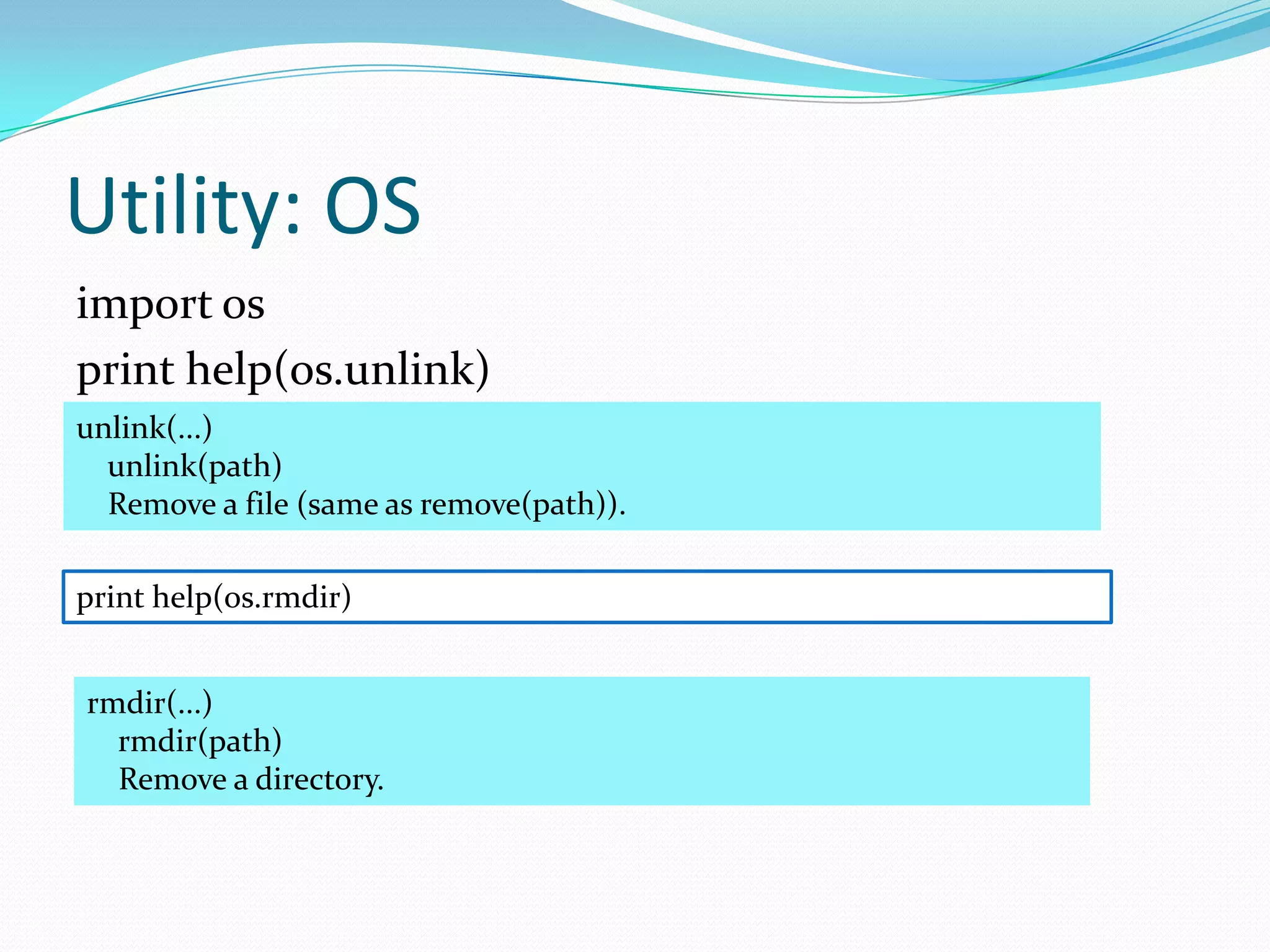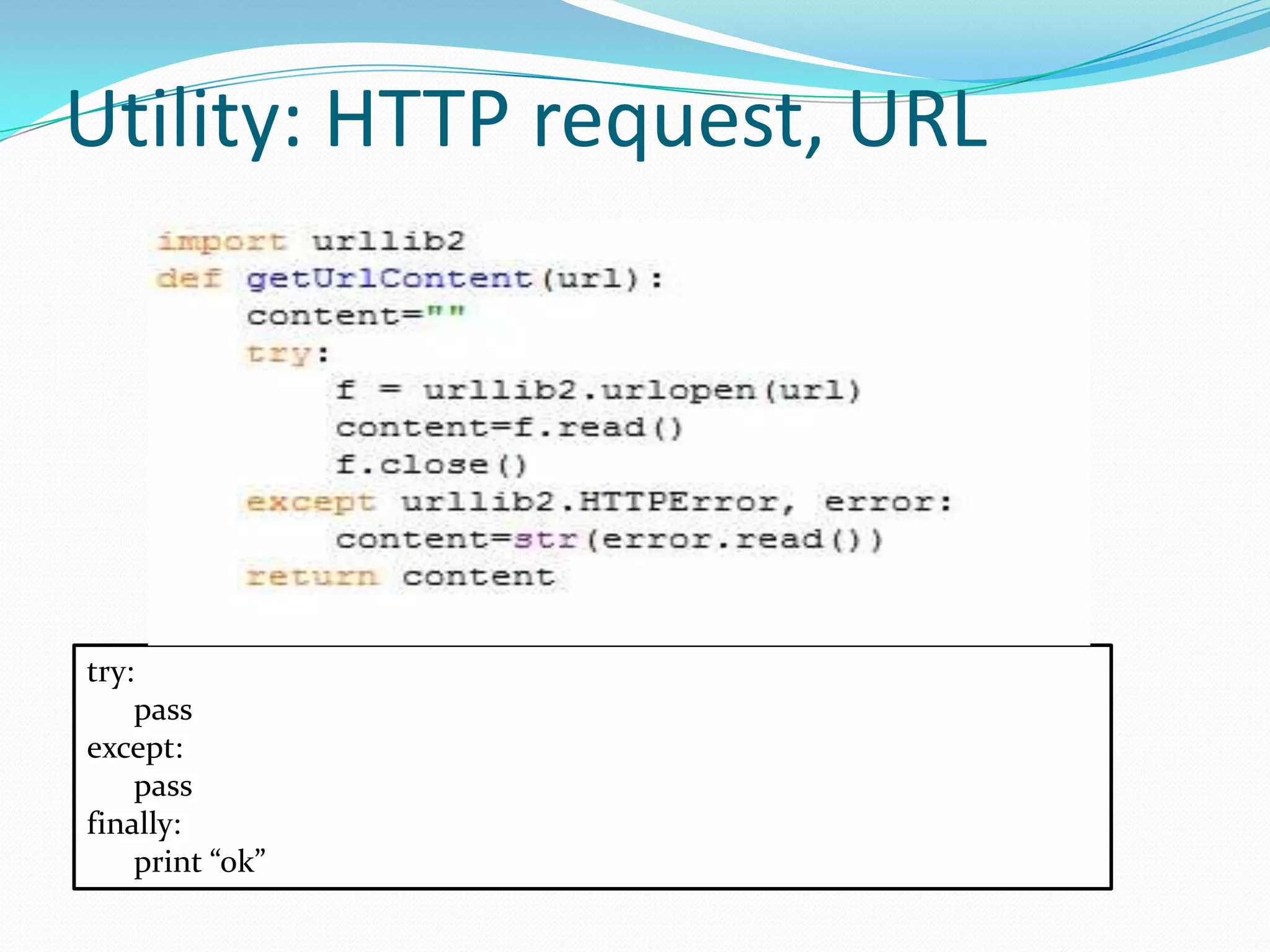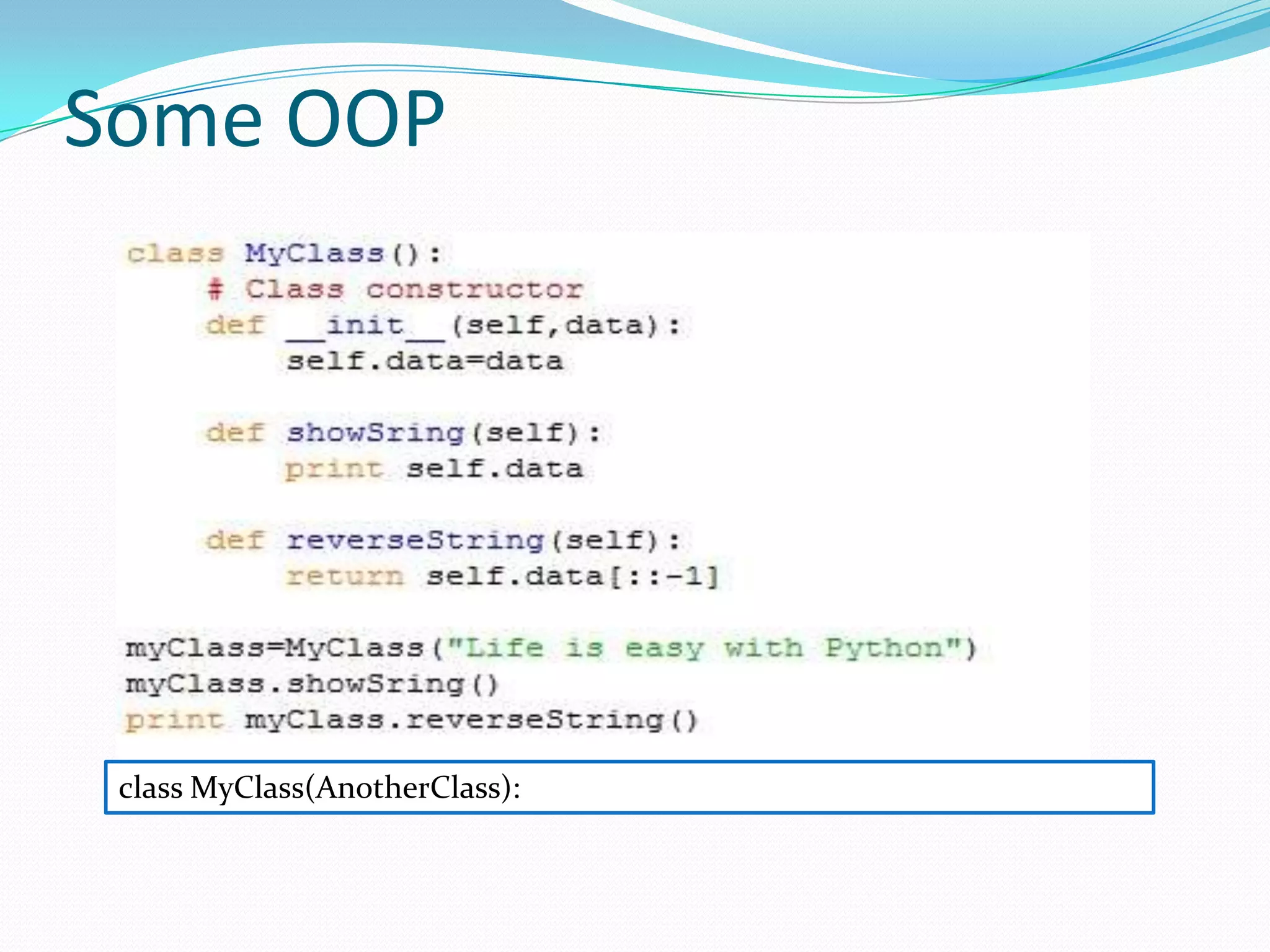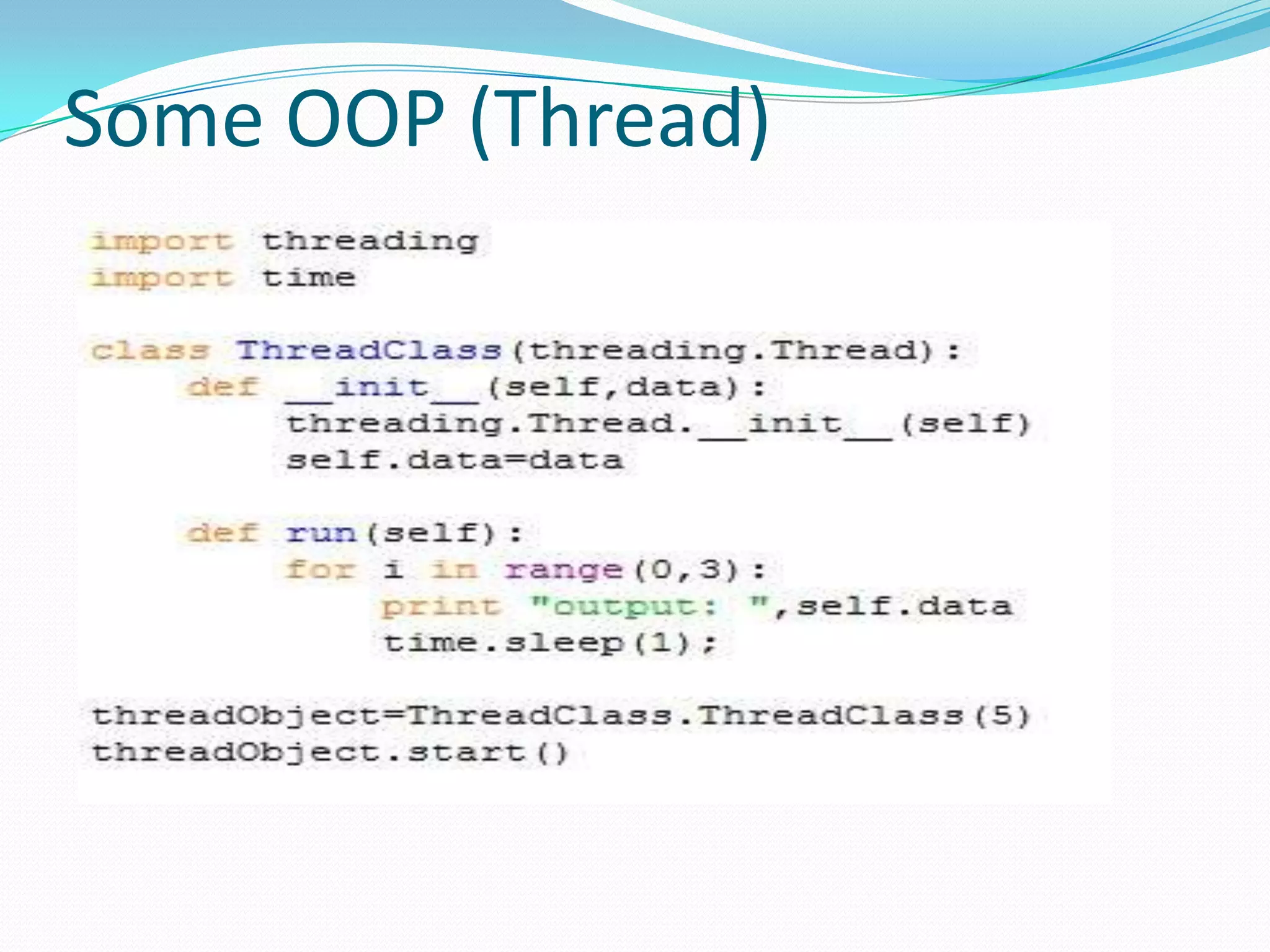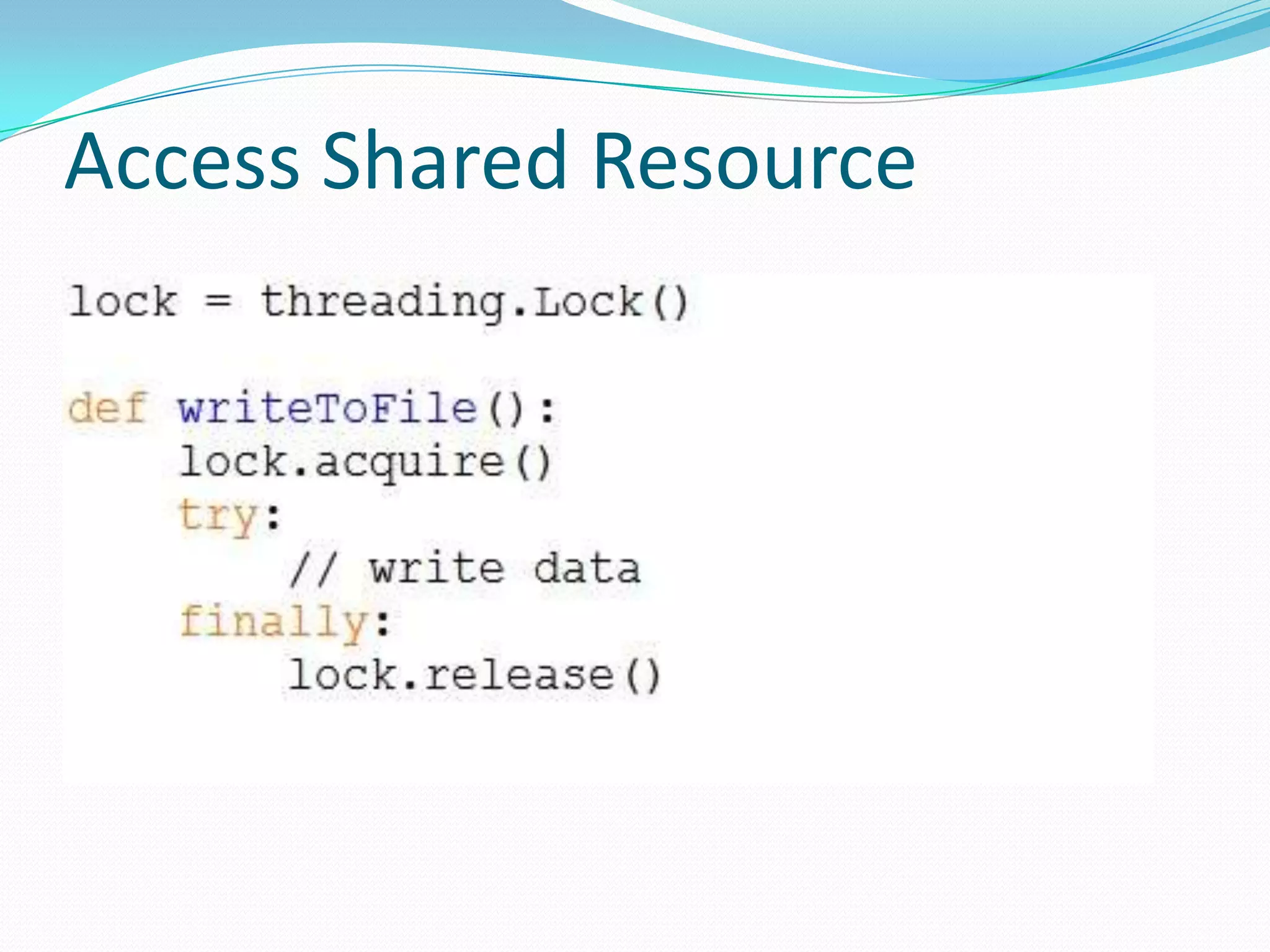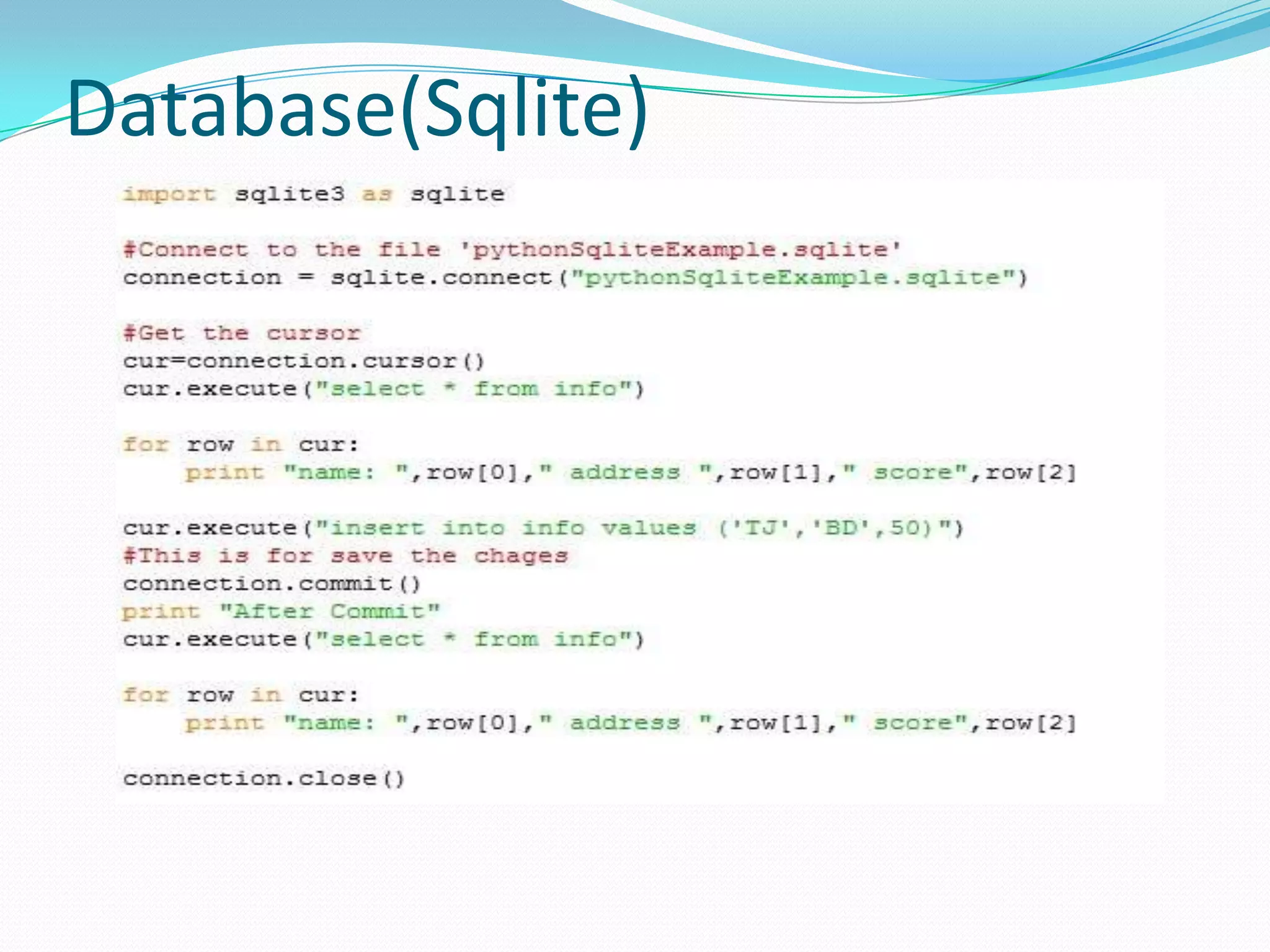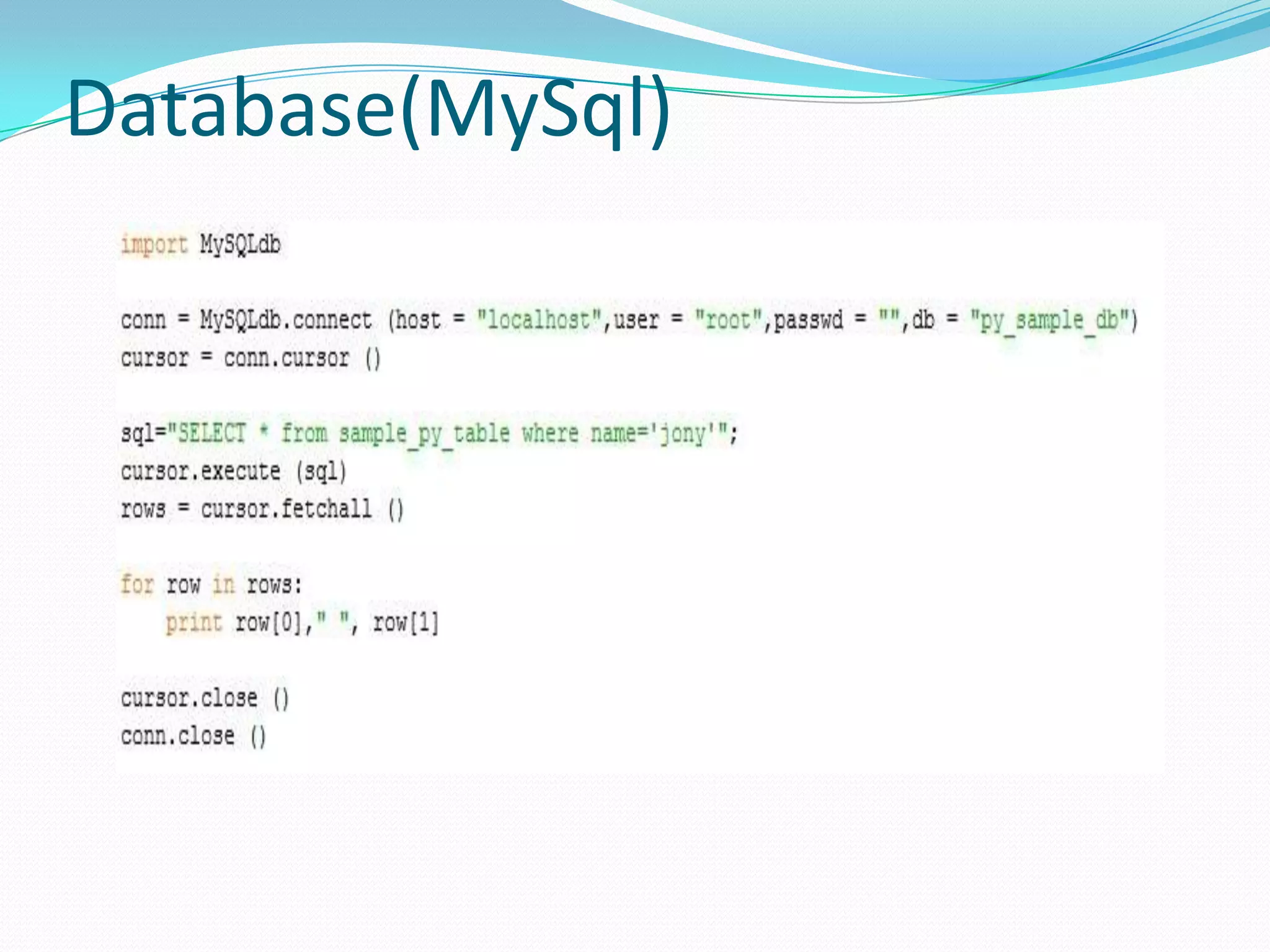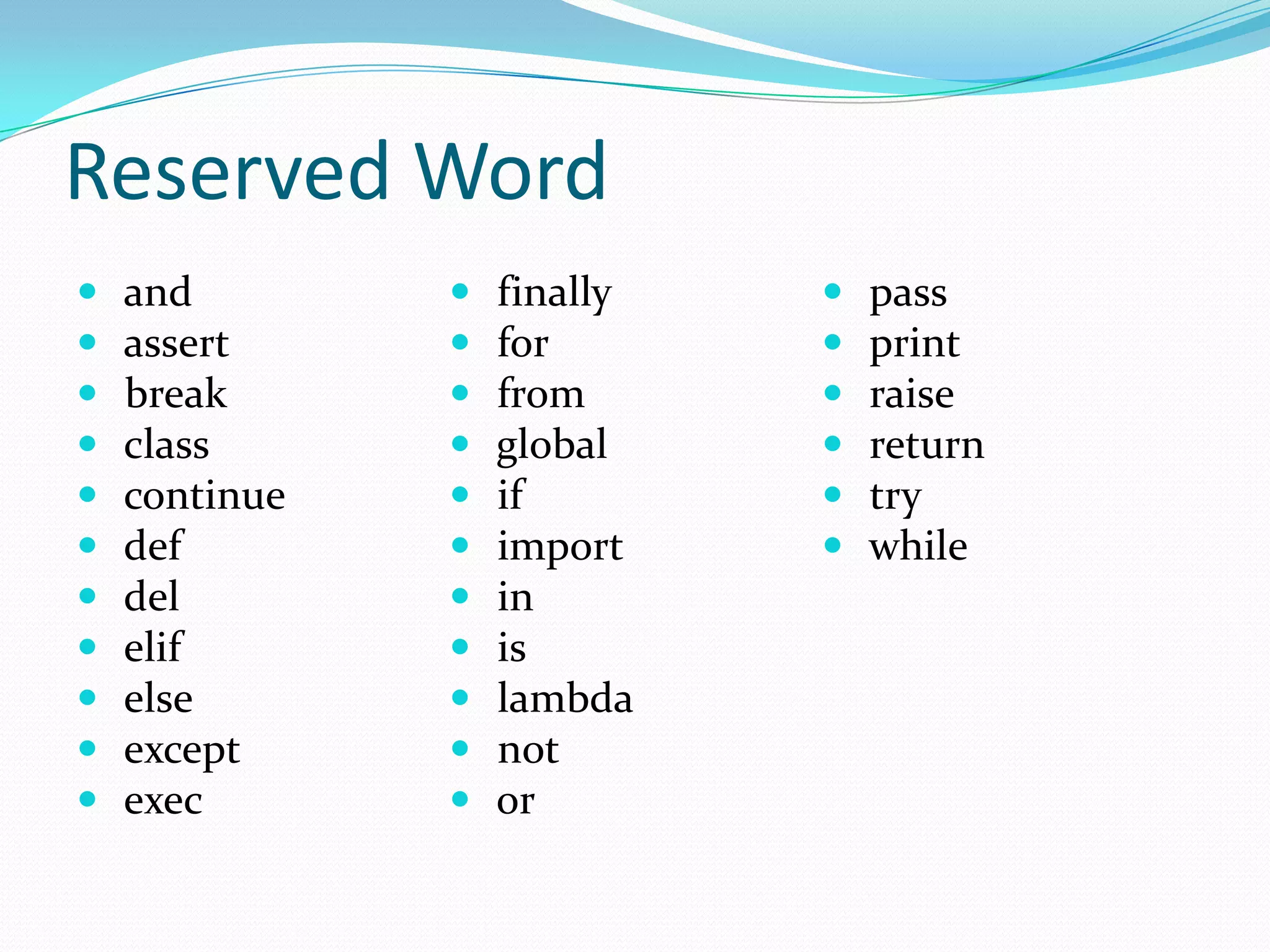This document provides an overview of the Python programming language. It includes several code examples and summaries of key Python concepts like strings, lists, tuples, dictionaries, files, regular expressions, and object-oriented programming. It also lists some common Python functions and modules for tasks like HTTP requests and database access. The document aims to introduce Python's main features and provide basic code samples to help new Python learners.

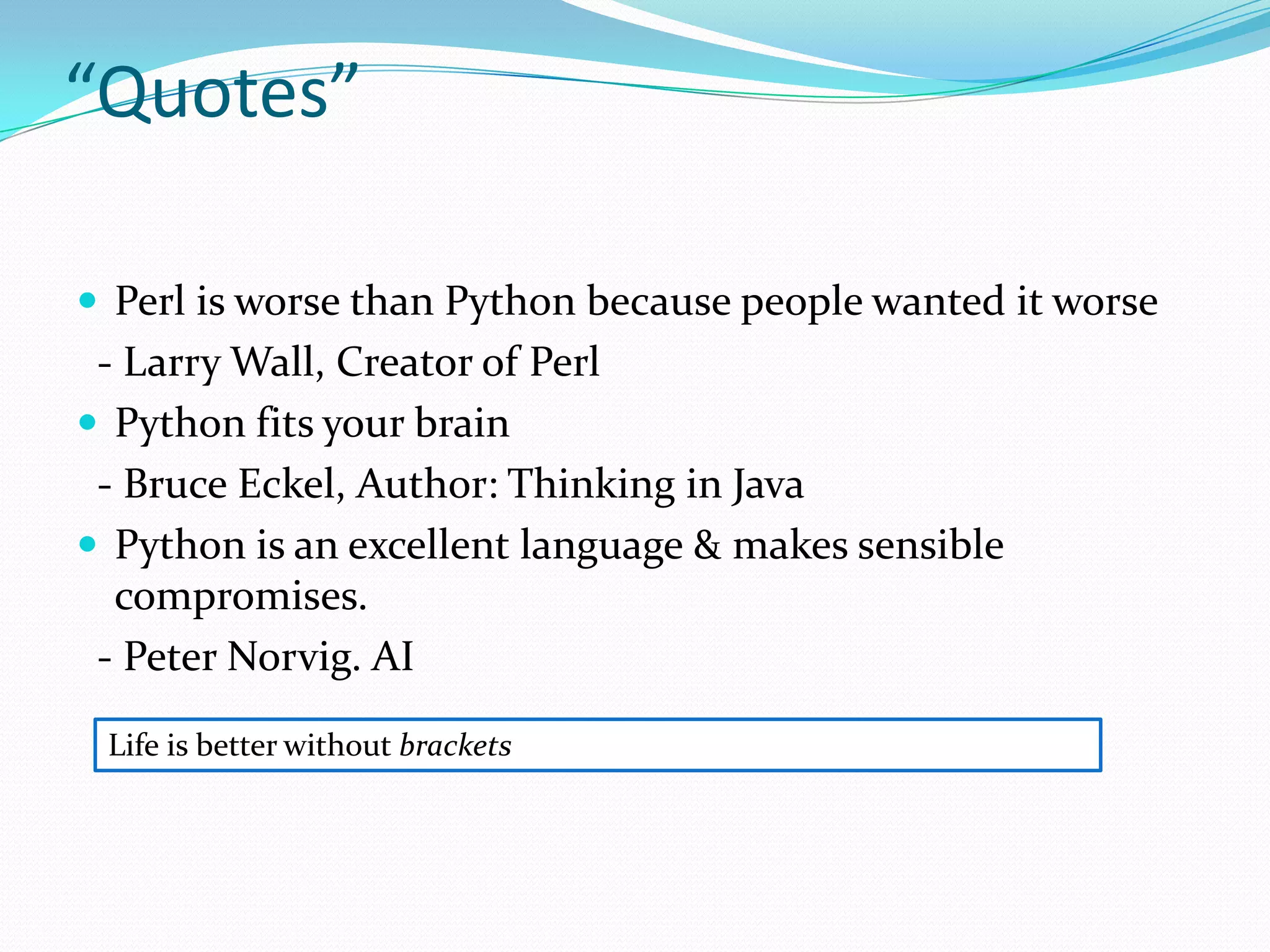
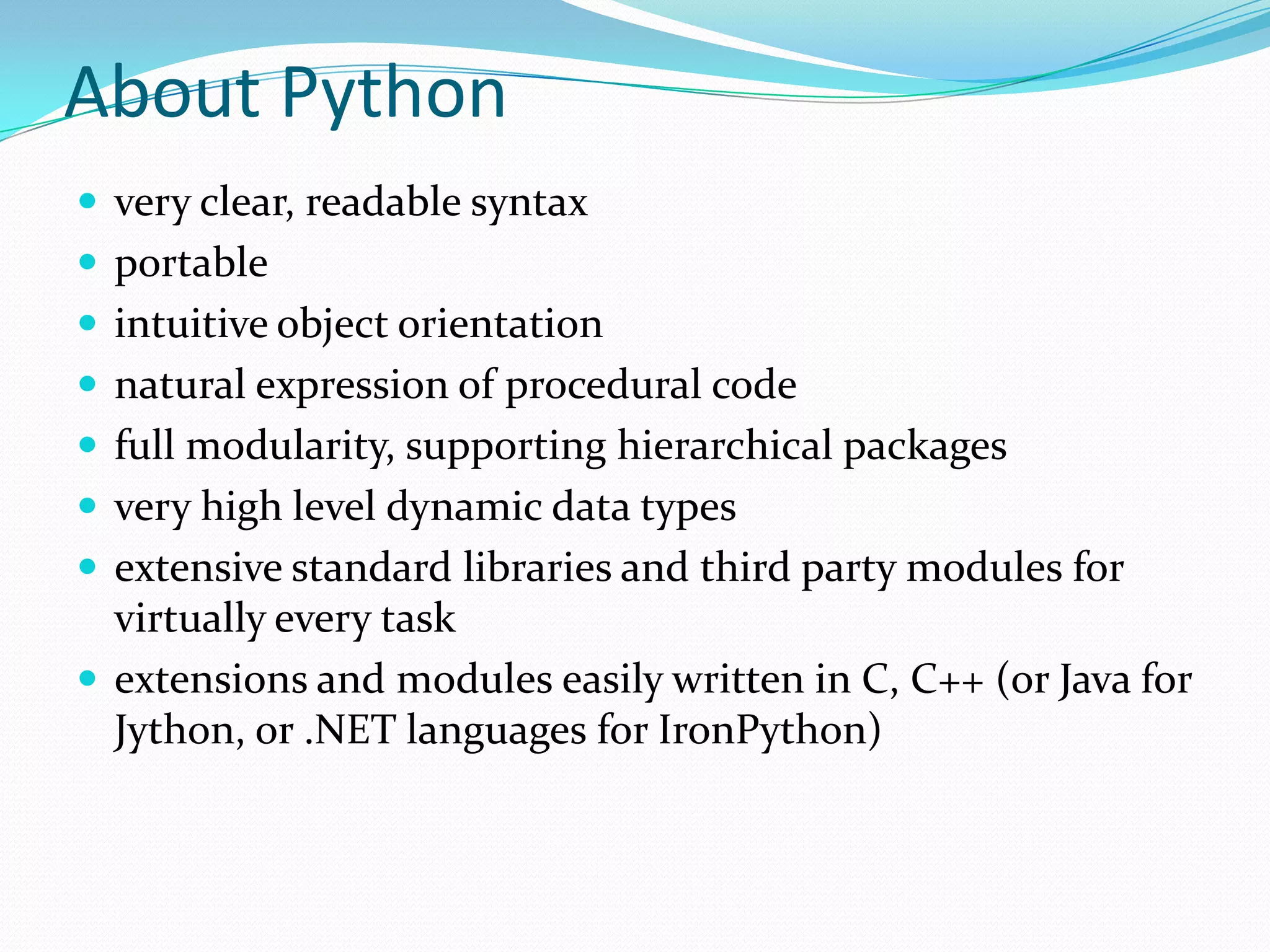
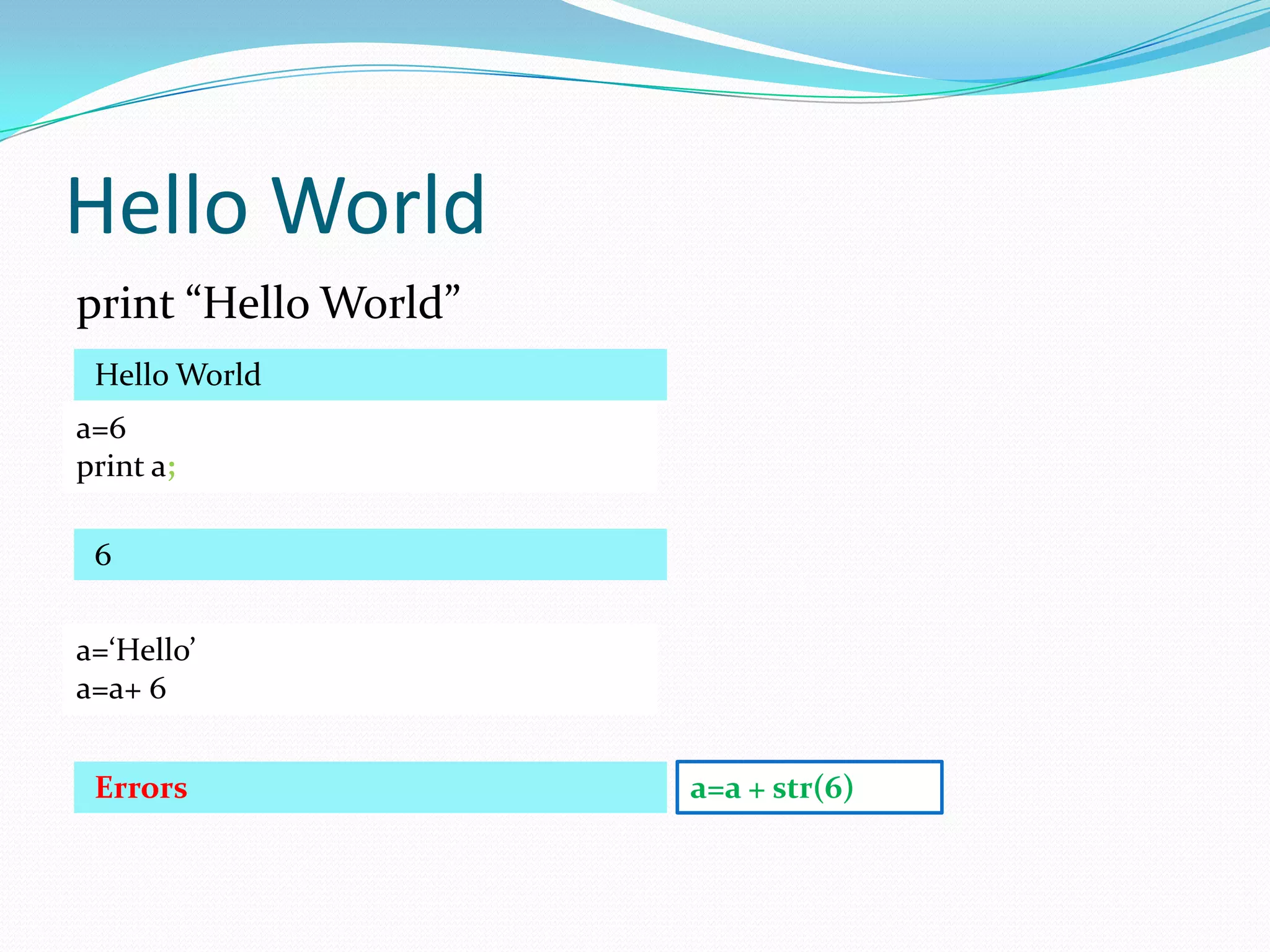

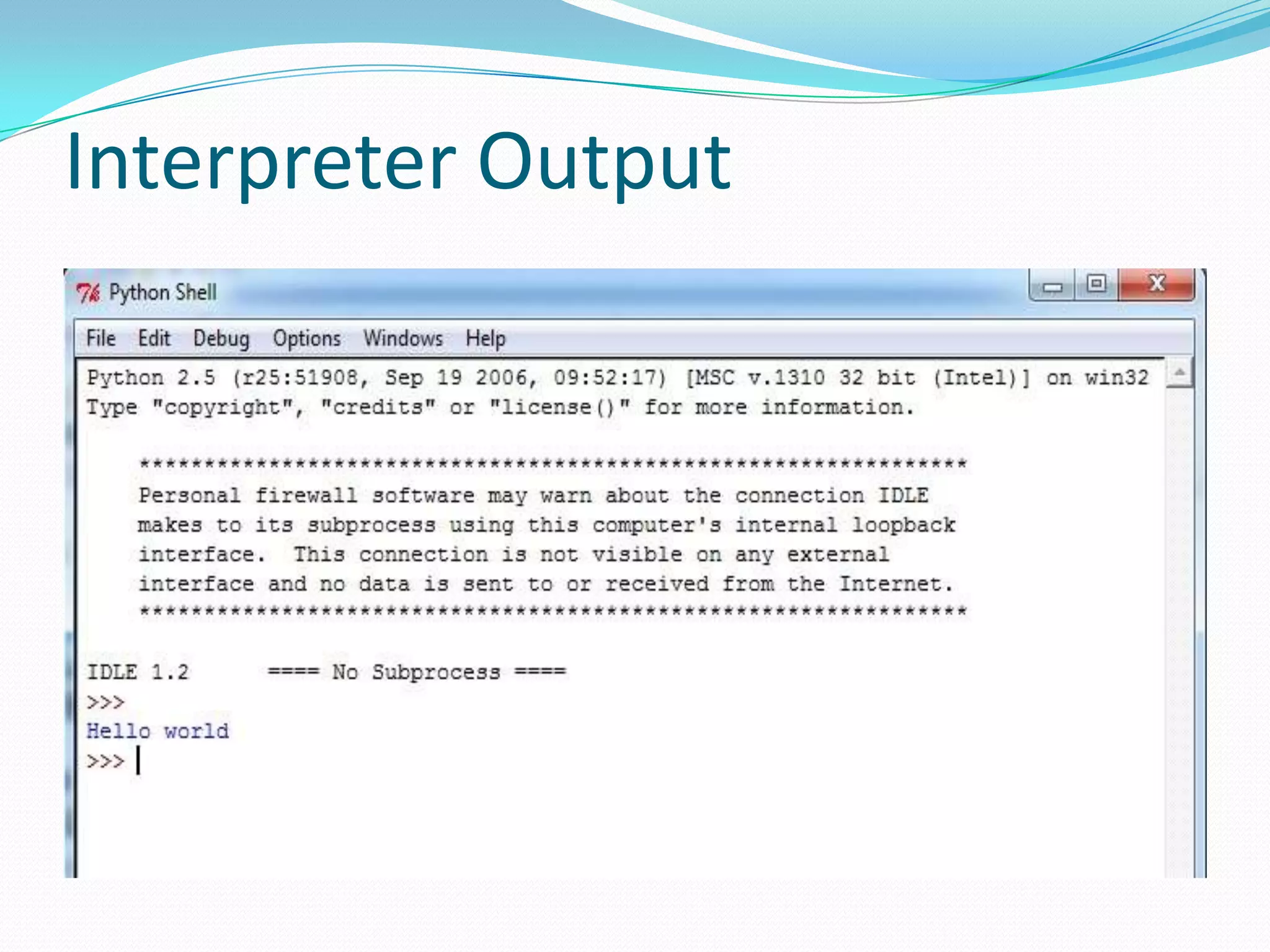
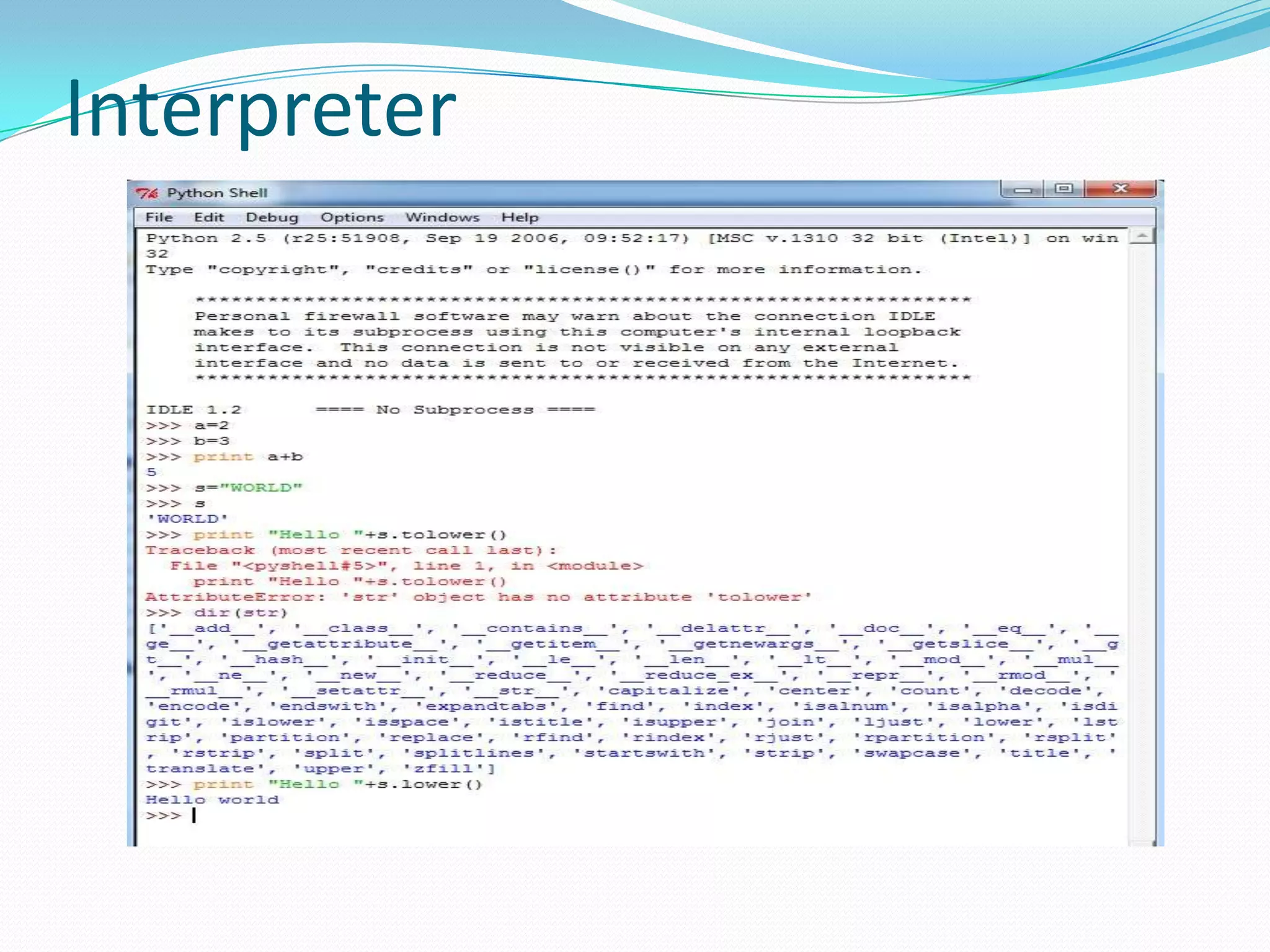
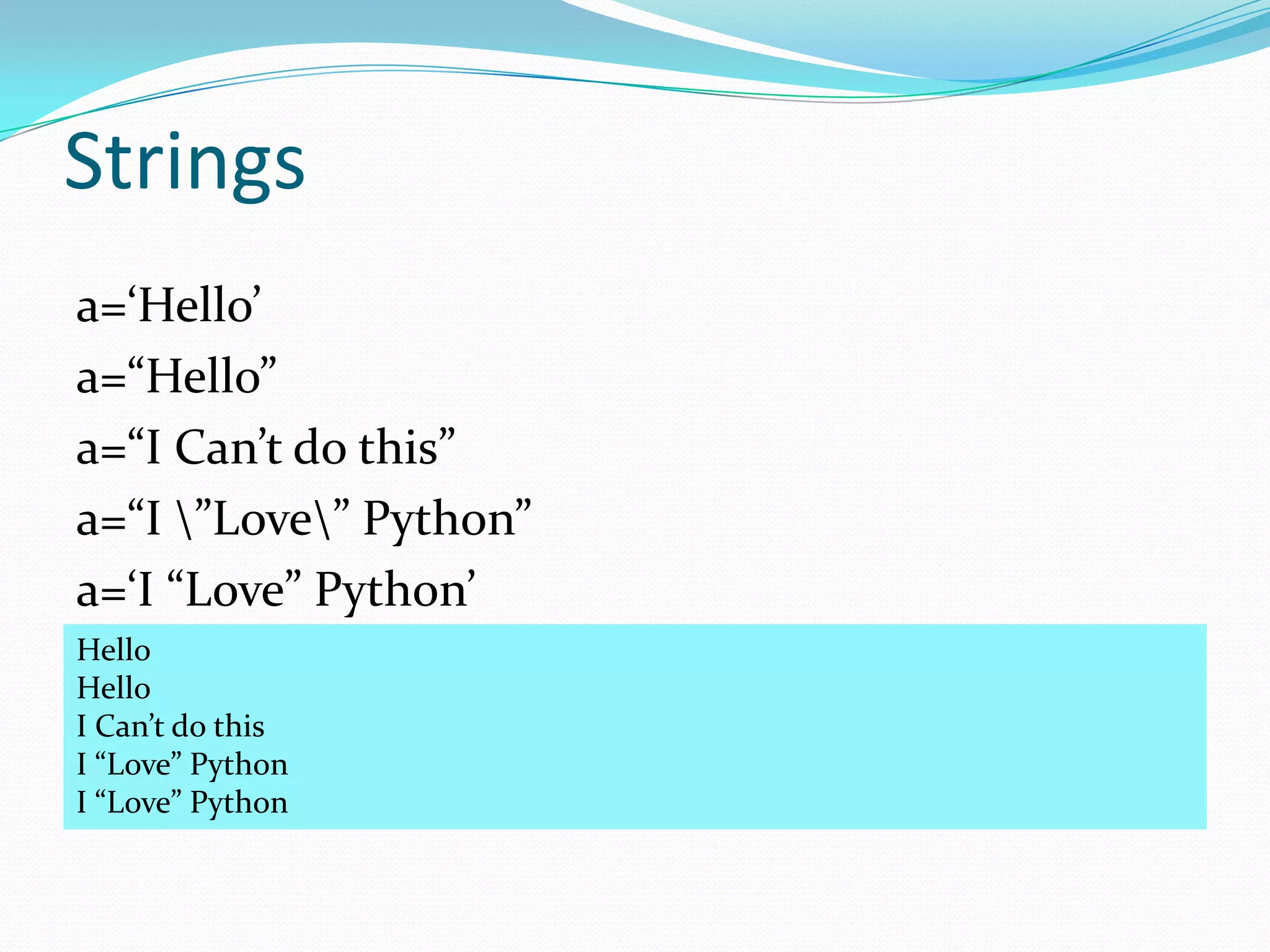
![a=“Hello”
print a[0]
print len(a)
print a[0:2]
print a[2:]
H
5
He
llo](https://image.slidesharecdn.com/jonypython-121023021053-phpapp02/75/python-beginner-talk-slide-9-2048.jpg)
![a=“Hello”
print a[-1]
print a[-2:]
o
lo](https://image.slidesharecdn.com/jonypython-121023021053-phpapp02/75/python-beginner-talk-slide-10-2048.jpg)
![More About str Class
print dir(str)
['__add__', '__class__', '__contains__', '__delattr__', '__doc__', '__eq__', '__ge__',
'__getattribute__', '__getitem__', '__getnewargs__', '__getslice__', '__gt__',
'__hash__', '__init__', '__le__', '__len__', '__lt__', '__mod__', '__mul__', '__ne__',
'__new__', '__reduce__', '__reduce_ex__', '__repr__', '__rmod__', '__rmul__',
'__setattr__', '__str__', 'capitalize', 'center', 'count', 'decode', 'encode', 'endswith',
'expandtabs', 'find', 'index', 'isalnum', 'isalpha', 'isdigit', 'islower', 'isspace', 'istitle',
'isupper', 'join', 'ljust', 'lower', 'lstrip', 'partition', 'replace', 'rfind', 'rindex', 'rjust',
'rpartition', 'rsplit', 'rstrip', 'split', 'splitlines', 'startswith', 'strip', 'swapcase', 'title',
'translate', 'upper', 'zfill']](https://image.slidesharecdn.com/jonypython-121023021053-phpapp02/75/python-beginner-talk-slide-11-2048.jpg)
![Help Class
print help(str.find)
find(...)
S.find(sub [,start [,end]]) -> int
Return the lowest index in S where substring sub is found,
such that sub is contained within s[start,end]. Optional
arguments start and end are interpreted as in slice notation.
Return -1 on failure.](https://image.slidesharecdn.com/jonypython-121023021053-phpapp02/75/python-beginner-talk-slide-12-2048.jpg)
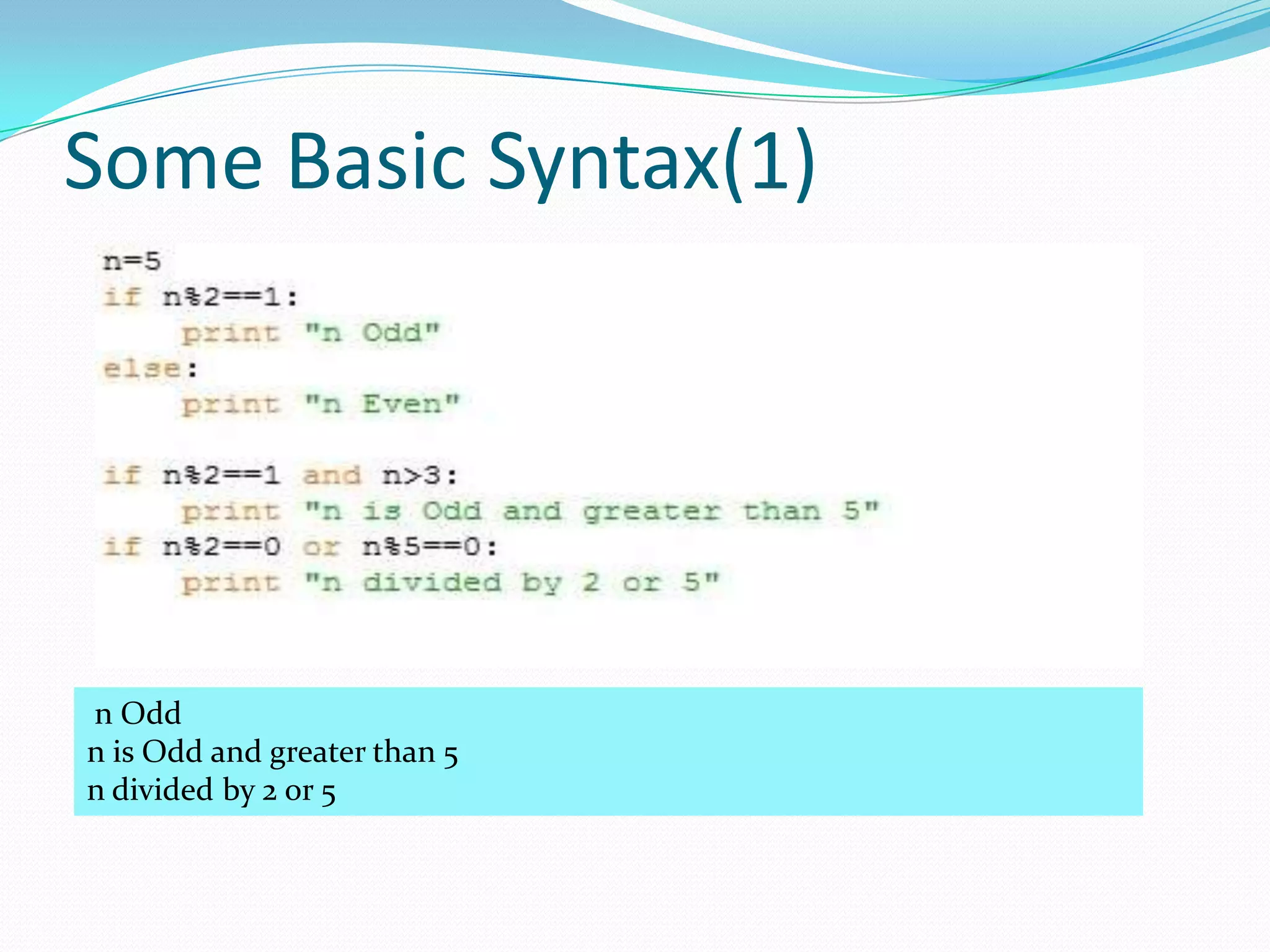
![Some Basic Syntax(1)
//Array Declaration
a=[]
2
1
5
Using Range:
2
1
5
True](https://image.slidesharecdn.com/jonypython-121023021053-phpapp02/75/python-beginner-talk-slide-14-2048.jpg)
![List(1)
a=[3,1,5]
b=[4,2]
c=a+b
print c
del c[2]
print c
print len(c)
[3,1,5,4,2]
[3,1,4,2]
4](https://image.slidesharecdn.com/jonypython-121023021053-phpapp02/75/python-beginner-talk-slide-15-2048.jpg)
![List(2)
(a,b)=([3,1,5],[4,2])
c=a+b
c= sorted(c)
print sorted(c)
print a==b
print sorted(c,reverse=True)
print c
print help(sorted)
[1,2,3,4,5]
False
[5,4,3,2,1]
[3, 1, 5, 4, 2]
Help on built-in function sorted in module __builtin__:
sorted(...)
sorted(iterable, cmp=None, key=None, reverse=False) --> new sorted list](https://image.slidesharecdn.com/jonypython-121023021053-phpapp02/75/python-beginner-talk-slide-16-2048.jpg)
![List and Sort
a=['ax','aae','aac']
return 1,”Hello World”
def mFun(s):
a,b=mFun(“Hi”)
return s[-1]
print sorted(a,key=mFun)
print sorted(a,key=mFun,reverse=True)
print sorted(a,key=len)
['aac', 'aae', 'ax']
['ax', 'aae', 'aac']
['ax', 'aae', 'aac']](https://image.slidesharecdn.com/jonypython-121023021053-phpapp02/75/python-beginner-talk-slide-17-2048.jpg)
![Tuples
a=(1,2,1)
print a[0]
print len(a)
b=[(1,2,3),(1,2,1),(1,4,1)]
print a in b
1
3
True](https://image.slidesharecdn.com/jonypython-121023021053-phpapp02/75/python-beginner-talk-slide-18-2048.jpg)
![Tuples and sort
a=[(1,"b"),(2,"a"),(1,"e")]
print a
print sorted(a)
def myTSort(d):
return d[0]
print sorted(a,key=myTSort)
k=(1,”e”)
print k in a
[(1, 'b'), (2, 'a'), (1, 'e')]
[(1, 'b'), (1, 'e'), (2, 'a')]
[(2, 'a'), (1, 'b'), (1, 'e')]
True](https://image.slidesharecdn.com/jonypython-121023021053-phpapp02/75/python-beginner-talk-slide-19-2048.jpg)
![Dictionary
d={}
d[‘a’]=‘alpha’
d[‘o’]=‘omega’
d[‘g’]=‘gamma’
print d[‘a’]
alpha](https://image.slidesharecdn.com/jonypython-121023021053-phpapp02/75/python-beginner-talk-slide-20-2048.jpg)
![Dictionary
d={}
(d['a'],d['o'],d['g'])=("alpha","omega","gamma")
print d
print len(d)
{'a': 'alpha', 'g': 'gamma', 'o': 'omega'}
3
Check a value is in dictionary ???
‘a’ in d](https://image.slidesharecdn.com/jonypython-121023021053-phpapp02/75/python-beginner-talk-slide-21-2048.jpg)
![Dictionary
d={}
(d['a'],d['o'],d['g'])=("alpha","omega","gamma")
print d[‘a’]
print d[‘x’] //???
print d.get(‘x’) // return None
print d.get(‘a’)
if(d.get(‘a’)){
print ‘Yes’
}](https://image.slidesharecdn.com/jonypython-121023021053-phpapp02/75/python-beginner-talk-slide-22-2048.jpg)
![Dictionary
d={}
(d['a'],d['o'],d['g'])=("alpha","omega","gamma")
print d.keys()
print d.values()
print d.items()
['a', 'g', 'o']
['alpha', 'gamma', 'omega']
[('a', 'alpha'), ('g', 'gamma'), ('o', 'omega')]
What needs for sorted dictionary data(key order) ???
All data returns random order
for k in sorted( d.keys() ):
print d[k]
print sorted(d.keys())](https://image.slidesharecdn.com/jonypython-121023021053-phpapp02/75/python-beginner-talk-slide-23-2048.jpg)
![Dictionary
print dir(dict)
['__class__', '__cmp__', '__contains__', '__delattr__', '__delitem__',
'__doc__', '__eq__', '__ge__', '__getattribute__', '__getitem__', '__gt__',
'__hash__', '__init__', '__iter__', '__le__', '__len__', '__lt__', '__ne__',
'__new__', '__reduce__', '__reduce_ex__', '__repr__', '__setattr__',
'__setitem__', '__str__', 'clear', 'copy', 'fromkeys', 'get', 'has_key', 'items',
'iteritems', 'iterkeys', 'itervalues', 'keys', 'pop', 'popitem', 'setdefault', 'update',
'values']
print help(dict)
print help(dict.items)](https://image.slidesharecdn.com/jonypython-121023021053-phpapp02/75/python-beginner-talk-slide-24-2048.jpg)
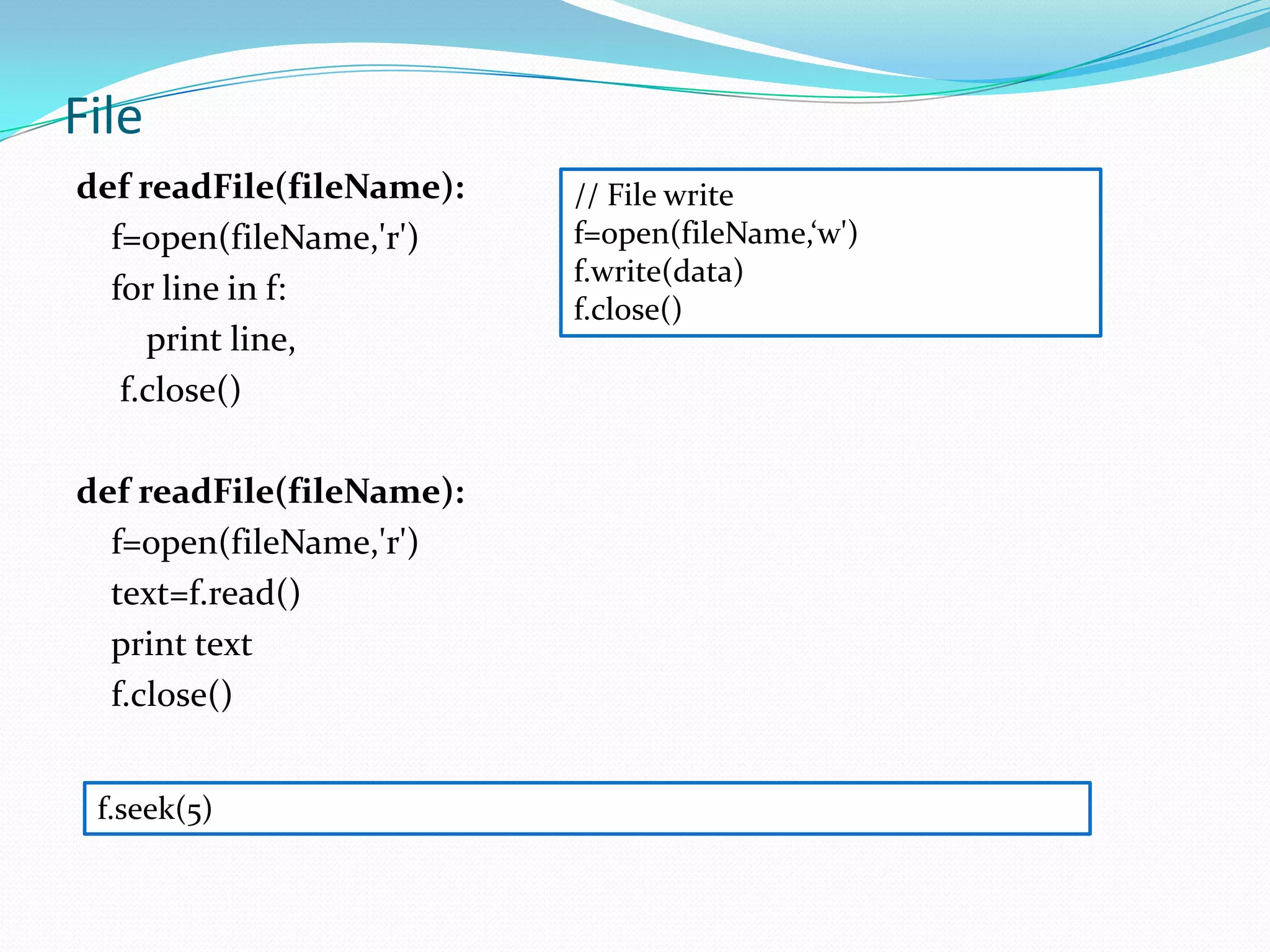
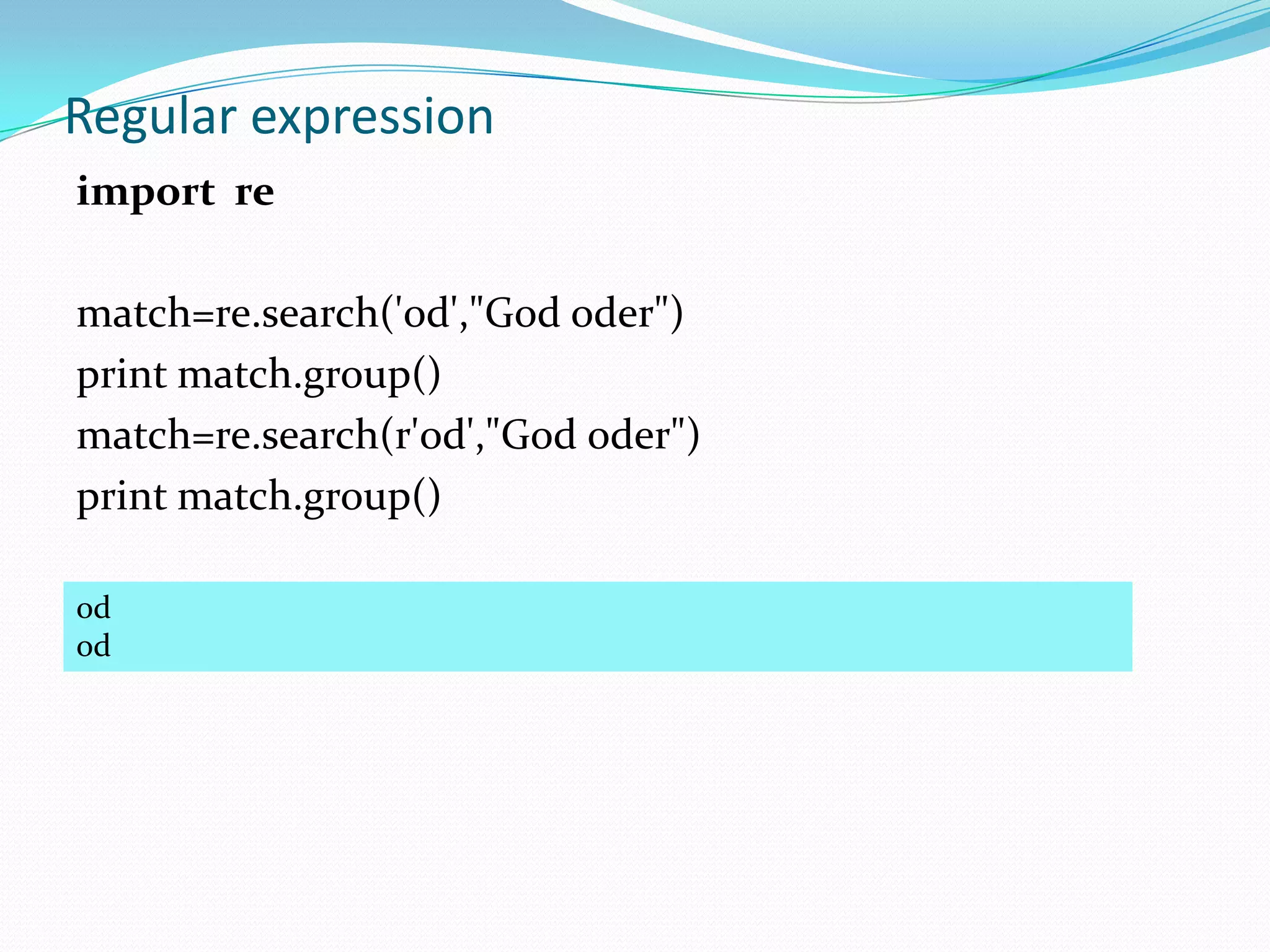
![Regular expression
import re
print re.findall(r'ar+','a ar arr')
print re.findall(r'ar*','a ar arr')
['ar', 'arr']
['a', 'ar', 'arr']
+ for 1 or more
* for 0 or more
print dir(re)](https://image.slidesharecdn.com/jonypython-121023021053-phpapp02/75/python-beginner-talk-slide-27-2048.jpg)
![Utility: OS
import os
print dir(os)
['F_OK', 'O_APPEND', 'O_BINARY', 'O_CREAT', 'O_EXCL',
'O_NOINHERIT', 'O_RANDOM', 'O_RDONLY', 'O_RDWR',
'O_SEQUENTIAL', 'UserDict', 'W_OK', 'X_OK', '_Environ', '__all__',
'__builtins__', '__doc__', '__file__', '__name__', '_copy_reg',
'_pickle_statvfs_result', 'abort', 'access', 'altsep', 'chdir', 'chmod', 'close',
'curdir', 'defpath', 'isatty', 'linesep', 'listdir', 'lseek', 'lstat', 'makedirs', 'mkdir',
'name', 'open', 'pardir', 'path', 'pathsep', 'pipe', 'popen', 'popen2', 'popen3',
'popen4', 'putenv', 'read', 'remove', 'removedirs', 'rename', 'renames', 'rmdir',
'sep', 'spawnl', 'spawnle', 'spawnv', 'spawnve', 'startfile', 'stat',
'stat_float_times', 'stat_result', 'statvfs_result', 'strerror', 'sys', 'system',
'tempnam', 'times', 'tmpfile', 'tmpnam', 'umask', 'unlink', 'unsetenv',
'urandom', 'utime', 'waitpid', 'walk', 'write']](https://image.slidesharecdn.com/jonypython-121023021053-phpapp02/75/python-beginner-talk-slide-28-2048.jpg)
